- Clone
- TS2/9 (See other available formats)
- Regulatory Status
- RUO
- Other Names
- Lymphocyte function-associated antigen 3, LFA-3
- Isotype
- Mouse IgG1, κ
- Ave. Rating
- Submit a Review
- Product Citations
- publications
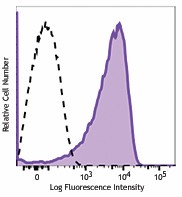
-

Human peripheral blood lymphocytes were stained with CD58 (clone TS2/9) APC (filled histogram) or mouse IgG1, κ APC isotype control (open histogram).
| Cat # | Size | Price | Quantity Check Availability | Save | ||
|---|---|---|---|---|---|---|
| 330917 | 25 tests | 91€ | ||||
| 330918 | 100 tests | 233€ | ||||
CD58, also known as lymphocyte function-associated antigen 3 (LFA-3) is a 45-70 kD cell surface protein that is a member of the immunoglobulin superfamily. Alternative splicing of CD58 gives rise to transmembrane and glycosylphosphatidylinositol (GPI)-anchored forms on cell surface. CD58 is expressed on both hematopoietic and non-hematopoietic cells including B cells, T cells, monocytes, erythrocytes, endothelial cells, epithelial cells, and fibroblasts. High levels are observed on memory T cells and dendritic cells. CD58 expressed on antigen presenting cells and target cells enhances T cell recognition via the binding of it's cognate ligand, CD2, on the T cell surface.
Product DetailsProduct Details
- Verified Reactivity
- Human
- Reported Reactivity
- African Green, Baboon, Cynomolgus, Rhesus
- Antibody Type
- Monoclonal
- Host Species
- Mouse
- Immunogen
- Human cytolytic T cells
- Formulation
- Phosphate-buffered solution, pH 7.2, containing 0.09% sodium azide and BSA (origin USA)
- Preparation
- The antibody was purified by affinity chromatography and conjugated with APC under optimal conditions.
- Concentration
- Lot-specific (to obtain lot-specific concentration and expiration, please enter the lot number in our Certificate of Analysis online tool.)
- Storage & Handling
- The antibody solution should be stored undiluted between 2°C and 8°C, and protected from prolonged exposure to light. Do not freeze.
- Application
-
FC - Quality tested
- Recommended Usage
-
Each lot of this antibody is quality control tested by immunofluorescent staining with flow cytometric analysis. For flow cytometric staining, the suggested use of this reagent is 5 µl per million cells or 5 µl per 100 µl of whole blood. It is recommended that the reagent be titrated for optimal performance for each application.
- Excitation Laser
-
Red Laser (633 nm)
- Application Notes
-
Additional reported applications include: immunoprecipitation1, inhibition of cytolytic activity1, augment of IL-1 release by TE cells2
- Application References
-
- Sanchez-Madrid F, et al. 1982. Proc. Nati Acad. Sci. USA. 79:7489
- Le PT, et al. 1990. J. Immunol. 144:4541
- Product Citations
-
- RRID
-
AB_2650885 (BioLegend Cat. No. 330917)
AB_2650886 (BioLegend Cat. No. 330918)
Antigen Details
- Structure
- Immunoglobulin superfamily member, 45-70 kD cell surface protein. Alternative splicing gives rise to transmembrane and glycosylphosphatidylinositol (GPI)-anchored form on cell surface.
- Distribution
-
Expressed on both hematopoietic and non-hematopoietic cells including B cells, T cells, monocytes, erythrocytes, endothelial cells, epithelial cells, and fibroblasts. High levels are observed on memory T cells and dendritic cells.
- Function
- Mediates adhesion between various cell types (target cells and cytotoxic cells, APC and T cells, thymocytes and thymic epithelia).
- Ligand/Receptor
- CD2
- Cell Type
- B cells, Dendritic cells
- Biology Area
- Cell Adhesion, Cell Biology, Costimulatory Molecules, Immunology
- Molecular Family
- CD Molecules
- Antigen References
-
1. Springer TA, et al. 1987. Annu. Rev. Immunol. 5:223.
2. Dustin ML, et al. 1987. Nature 329:846.
3. Arulanandam AR, et al. 1994. J. Exp. Med. 180:1861.
4. Sanders ME, et al. 1988. J. Immunol. 140:1401. - Gene ID
- 965 View all products for this Gene ID
- UniProt
- View information about CD58 on UniProt.org
Related FAQs
Other Formats
View All CD58 Reagents Request Custom Conjugation| Description | Clone | Applications |
|---|---|---|
| Purified anti-human CD58 (LFA-3) | TS2/9 | FC,IP |
| PE anti-human CD58 (LFA-3) | TS2/9 | FC |
| PE/Cyanine5 anti-human CD58 | TS2/9 | FC |
| PerCP/Cyanine5.5 anti-human CD58 (LFA-3) | TS2/9 | FC |
| PE/Cyanine7 anti-human CD58 (LFA-3) | TS2/9 | FC |
| APC anti-human CD58 (LFA-3) | TS2/9 | FC |
| TotalSeq™-A0174 anti-human CD58 (LFA-3) | TS2/9 | PG |
| TotalSeq™-C0174 anti-human CD58 (LFA-3) | TS2/9 | PG |
| Ultra-LEAF™ Purified anti-human CD58 (LFA-3) | TS2/9 | FC,IP,IHC,Block |
| TotalSeq™-B0174 anti-human CD58 (LFA-3) | TS2/9 | PG |
| TotalSeq™-D0174 anti-human CD58 (LFA-3) | TS2/9 | PG |
| PE anti-human CD58 | TS2/9 | FC |
| Alexa Fluor® 488 anti-human CD58 Antibody | TS2/9 | FC |
| Brilliant Violet 421™ anti-human CD58 Antibody | TS2/9 | FC |
Customers Also Purchased
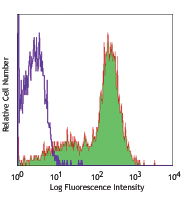
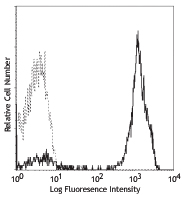
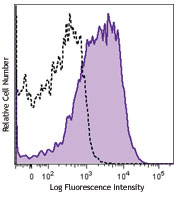

Compare Data Across All Formats
This data display is provided for general comparisons between formats.
Your actual data may vary due to variations in samples, target cells, instruments and their settings, staining conditions, and other factors.
If you need assistance with selecting the best format contact our expert technical support team.
-
Purified anti-human CD58 (LFA-3)
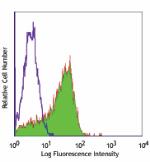
Human peripheral blood lymphocytes stained with purified TS2... -
PE anti-human CD58 (LFA-3)
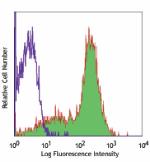
Human peripheral blood lymphocytes stained with TS2/9 PE -
PE/Cyanine5 anti-human CD58
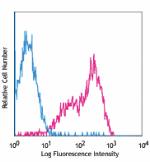
Human peripheral blood lymphocytes stained with TS2/9 PE/Cya... -
PerCP/Cyanine5.5 anti-human CD58 (LFA-3)
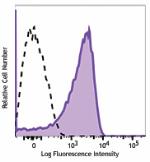
Human peripheral blood lymphocytes were stained with CD58 (c... -
PE/Cyanine7 anti-human CD58 (LFA-3)
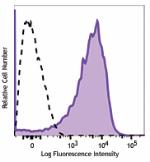
Human peripheral blood lymphocytes were stained with CD58 (c... -
APC anti-human CD58 (LFA-3)
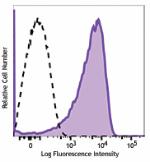
Human peripheral blood lymphocytes were stained with CD58 (c... -
TotalSeq™-A0174 anti-human CD58 (LFA-3)
-
TotalSeq™-C0174 anti-human CD58 (LFA-3)
-
Ultra-LEAF™ Purified anti-human CD58 (LFA-3)
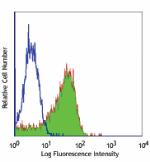
Human peripheral blood lymphocytes stained with Ultra-LEAF™ ... -
TotalSeq™-B0174 anti-human CD58 (LFA-3)
-
TotalSeq™-D0174 anti-human CD58 (LFA-3)
-
PE anti-human CD58
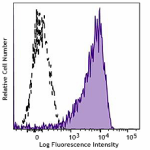
Typical results from human peripheral blood lymphocytes stai... -
Alexa Fluor® 488 anti-human CD58 Antibody

Human peripheral blood lymphocytes were stained with anti-hu... -
Brilliant Violet 421™ anti-human CD58 Antibody

Human peripheral blood lymphocytes were stained with anti-hu...
 Login / Register
Login / Register 













Follow Us